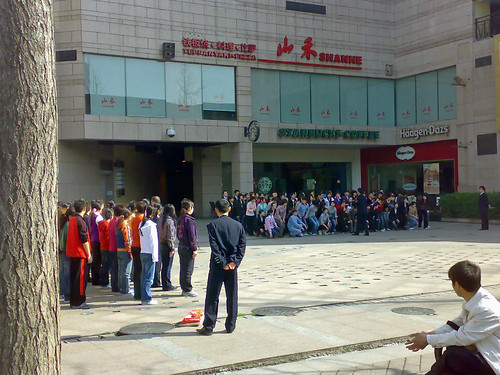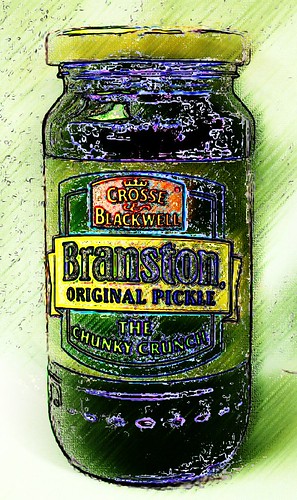Thursday, March 29, 2007
Customer Service Experience
Good customer service experiences can be had from and in-call service. For example, my Internet connection died over Chinese New Year. I can guess what the experience might have been in the UK during Christmas.
1. Depending on your ISP (and whether they've outsourced the call centre to Bangalore) you might just get a recorded message suggesting that everyone is partying and will get to you at some point.
2. If you do get through and they determine that its not a configuration problem and you need an engineer they will make an appointment for an engineer from another company to come, quite possibly for a hefty fee. Being a public holiday though, you'll be without service for several days until everyone's back to work and the backlog is cleared.
Compare that to the China experience.
1. Place call which is answered promptly. Determine that it is not an accounts receivable problem on their part and they will despatch an engineer to site, even though it's a public holiday.
2. 10 minutes later, receive call from engineer to say he's outside and to reconfirm address. Engineer arrives, fixes problem (which he says was caused by my wireless router and not their equipment) at no cost and leaves.
The China scenario would simply be unbelievable in the UK. It just couldn't be done.
Sadly, my experience in B&Q (a British DIY chain) was more like the UK experience.
1. Take purchase to check-out (it was very early so I avoided the normal 'joining the shorter of 2 queues only to find that the person in front of me has 12 items they wil have to look up in the pricing book - I always wondered if the name 'Be and Queue' was deliberately ironic).
2. Locate checkout staff who are mysteriously absent.
3. They scan your 3 purchases and 1 of them doesn't have a price in the computer.
4. Staff go to rush to the aisle where the item came from. I tell them they're 1.29 each. They go anyway.
5. Staff return and huddle round the computerised till and proudly state 'we don't sell these - they're not in the computer'.
6. I counter with 'you're a shop, you have goods, you know the price, I have money'
7. They 'mei banfa' me and that's that.
An attempt to suggest that their manager would probably like them to sell me the goods, take my money and reconcile it later al seems too complicated so I give up and leave.
So, at least a British firm in China can uphold its core customer service values...
Wednesday, March 28, 2007
Drill Instructors vs Starbucks
An, er, unique part of China life is watching a ragtag bunch of retail employees being put through their paces. Here the staff of a local department store were marching back and forth whilst the security guards barked orders at them.
Looking at the casually dressed yoofs lolloping about, it didn't appear to be of much value given that the barista confirmed that they go through this every day.
I've seen people from the local foot massage place running in unison round the block and waitresses and busboys all in a line receiving the daily lecture (which, I believe, is typically the same lecture every single day). I've suggested to my employees that we might do the same but oddly they don't seem too keen.
Monday, March 19, 2007
On Branding
There often seems to be little effort put into actual brand creation before companies embark on the production of packaging, fitting out of premises and mass advertising and this seems to make little sense at first.
I accept, of course, that a lot of these brands are designed for internal consumption therefore the 'English name' of the company or product is there to make the product look and feel more international. This leads to various nonsense such as kitchen manufacturers Soilm internationalisation cupboard. Some might have been OK if they had been spelled correctly (such as clothing range Flangship riob.rava) and others are grammatically and syntactically sound but still don't work for me (a Taiwanese baby food brand called Baby Enzymes puts me in mind of a factory with a conveyor belt full of babies and an industrial blender) and bathroom fittings brand C Standard (for situations where A standard or B standard would seem to be going over the top? Possibly the people that came up with this have reinterpreted the name American Standard...?)
To be fair, branding is obviously a fine art. I've wondered before whilst in China if the thing I'm looking at is a 'real' brand or not. For example, I don't think I'd come across Ermenigildo Zegna before I came to China and was surprised to learn it had been going since 1892.
So I don't really know how to tell if, for example, if something is a 'real' brand or not.
I tried coming up with simple rules but they're not always applicable:
1) Silly names are probably not 'real' brands - FALSE. OK, I think I can rule out Senda Woman by this rule but apparently not Vasto (link doesn't work in Firefox) and Wanko which seem to be real brands.
2) Brands which try to sound like another brand to leach off a major brand's poplarity are probably not 'real' brands - I think this one is mostly TRUE. Lots of examples here: YCC and YQQ zip manufacturers (clearly trying to leach off YKK), Agosdantum (even with the Aquascutum logo), Dancôme T-shirt manufacturer. One example of a company that has 'become' a real brand is Li-ning (sports good manufacturer - now a large, well established company who I initially took as a fake brand because of its logo).
3) Blatant rip-offs of another brand. TRUE.
 I accept that House of Lords might feel a bit threatened by his Tonyness' attempts to reform it and possibly this is a way to make a bit of cash to mount a defence but somehow I don't think so.
I accept that House of Lords might feel a bit threatened by his Tonyness' attempts to reform it and possibly this is a way to make a bit of cash to mount a defence but somehow I don't think so.Of course, from a retail customer perspective, even if there are brands I recognise it's not necessarily that clear that the goods are genuine. In a nearby department store, the signage in the menswear section all appears to have been made by hand (would you pay full price from something that purports to be the "Pierr eCardin" section?). My natural assumption is that companies are normally very defensive of their brand image and would never allow the sort of brand impact that hand-made signage would create but is that true?
Friday, March 16, 2007
On Branston Pickle
Woe. The Branston has run out.
I am, sadly, one of those expats who likes their 'old country' food too much to live without it in regular doses. The oft aforementioned City Shopper service does us proud for many items - Oxo cubes, Paxo, Colmans Mustard, Sharwoods Curry Sauces and Basmati Rice but... no Branston Pickle.
Branston Pickle is a food that seems to unite the British expats here for their fondness of it (we even felt the national twinge when the Branston factory burned down in 2004).
I don't know how long Branston pickle has remained an oversight to the expat shopping service. The services (and there are lots of them) that will ship British goods to hungry expats all stock Branston and for a markup of only 1000% to cover postage and packaging will ship worldwide.
So, British expats, time for the rallying cry.... "Bring out the Branston! Bring out the Branston!"
Thursday, March 15, 2007
As Billy Connolly Said
Well, I'm more intrigued how my nose happened to know that it was my 40th birthday just last month.
With the sort of military timing normally reserved for the 366th day after purchase of a complex household appliance for which no extended warranty has been purchased, I've started growing, er, a little moustache but slightly above my top lip.
Alas, it appears that with advancing age I will no longer be able to mock Victor Kyam and all of the other old fellas that need specialised trimmers. For shame.
If any of my older readers have any tips about other depressing fates lined up for me over the next 10 years please let me know.
Tuesday, March 13, 2007
On receiving a package
I feel a bit silly ordering running shoes from the US, given that the majority of them are manufactured here in China but as the average shop here thinks that size 43 is huge beyond belief, then I've got no chance.
However, getting hold of ones shoes is now even harder than ever. Fedex just rang to say my shoes were in Shanghai (only ordered two days ago from California so kudos to Running Warehouse for their excellent shipping service), however because of the "high value" of my shipment (a whole US$125) there were new customs clearance formalities which basically consist of sending them:
A copy of my passport info page
A copy of my visa
A copy of every stamp in my passport for 2007
Colour me suspicious but why would I have to prove to customs (apparently it's mandatory) that I'm in China to receive my package? What does my whereabouts or my status as a resident or the countries I have visited got to do with collecting duty on an inbound package?
Do they need this information to charge me duty? Clearly not.
Clearly then one is left with two possibilities:
1) Incompetence - they're not sure what they want so they ask for everything they can think of even though they don't have a good use for it. At least that way when someone starts asking questions, they can be sure to have lots of angles covered. And it keeps people gainfully employed processing unnecessary information.
2) Skullduggery - the information is being gathered for a use other than that for which it is purportedly being collected.
My money's on 1).



